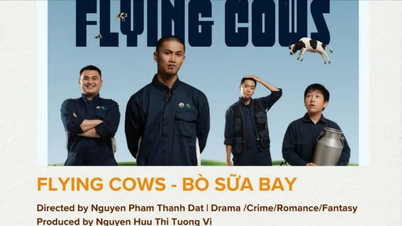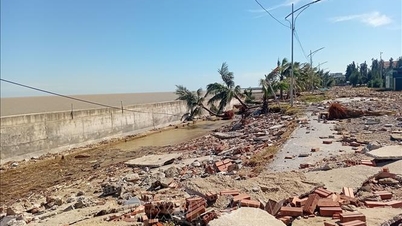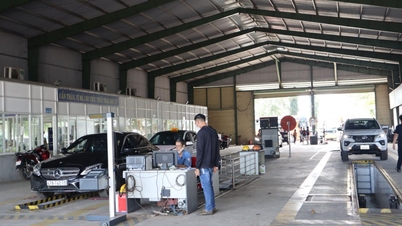A series of films released in theaters have earned hundreds of billions of dong in revenue in a short time, creating fevers from the beginning of 2025 until now, bringing a remarkable upturn to Vietnamese cinema.
According to statistics, in the first 6 months of 2025, Vietnamese film revenue exceeded 1,500 billion VND, an impressive number showing strong growth.
Sharing with VTC News Electronic Newspaper reporter, film critic Nguyen Le said that the revenue explosion of Vietnamese cinema has many factors, but we still have many weaknesses that need to be overcome.

"Tunnel" received many compliments from experts.
- In the first half of 2025, Vietnamese cinema witnessed many films reaching hundreds of billions in revenue. In your opinion, what are the important factors driving this growth?
In my opinion, the first reason is the idea. The films are showing a willingness to delve deeper into Vietnamese culture, whether modern or ancient, but the more ancient the more attractive.
The second reason is that both filmmakers and moviegoers realize that the world is paying more attention to Vietnamese cinema than before. This is a somewhat stronger motivation to create finished products that help the domestic box office become more fertile.
In addition, audiences are looking for something new, and the first half of the year had many new things to interest audiences (less remakes, more Vietnamese). Some cases are encouraged to be taken as a standard. A typical example is The Tunnels: The Sun in the Dark - a war film, promoting national spirit and privately invested.
- Despite high box office revenue, many films are still rated poorly for their scripts. Do you think filmmakers today understand audience tastes better, or are they just lucky to be on the right track?
I think it's both. Until now, since many scripts still use popular topics (mostly online and from young people) as the basis, the closeness of the film to the audience is obvious.
Whether that closeness creates goodwill to make success or not depends on the crew asking themselves. For example, "Do we really understand that trend?", "When that trend cools down, will the film have its own life, will it continue to live?".
- Some people say that many of the current hundred billion dollar movies are just “lucky”, and do not reflect a sustainable development of the film industry. What do you think?
Our film industry has the advantage of identifying the “big movie season” including Tet, summer or September 2. This shows that filmmakers have clear stages to aim for with the resources allowed.
However, if we consider sustainability on a more general level, I think we still have many areas that can be strengthened and refined to create attraction. Getting audiences to buy tickets based on the quality of the film and not on external factors such as famous actors, drama... is still not completely achieved.


Tran Thanh and Ly Hai's film is considered to be a step down from last year.
- So in your opinion, what are the weaknesses of Vietnamese cinema?
In my opinion, the biggest weakness is that most Vietnamese films still do not have an international mindset.
The storytelling of Vietnamese films is still very regional, requiring audiences to have a prior understanding of Vietnamese culture before they can access it. This creates an invisible pressure, making it difficult for international viewers to grasp or lose interest.

Journalist and film critic Nguyen Le.
Besides, many Vietnamese films rely too much on dialogue to convey content and messages, making the work more auditory instead of balancing images and sounds, while cinema is inherently a combination of both of these elements.
Another problem is that the English subtitling of films has not been given much attention. Some people even consider this a “troublesome” task. For the international market, subtitling is the first, or even the only, way for them to understand the film.
In addition, when Vietnamese films are released abroad, promotion is often aimed at the Vietnamese community. Meanwhile, international professionals such as film critics and journalists have difficulty accessing film crews or finding interpreters. This makes them lack the motivation to write articles or promote Vietnamese films.
Therefore, Vietnamese films appear at many international events, but still leave little impression. The films are shown, then quietly returned to digital platforms without really creating a buzz.
- When can Vietnamese cinema both achieve high revenue and create a lasting artistic mark of international stature?
In my opinion, it is important to upgrade the cinematic quality of storytelling. How to make the audience understand and feel the content only through images, not completely dependent on the dialogue. The success of Parasite (South Korea) is a clear demonstration of a very Korean story, but the storytelling is universal enough for international audiences to access, analyze and sympathize.
I also hope that in the near future, Vietnamese films will receive financial and spiritual support if they intend to be shown abroad.
In addition, there should be more re-screenings of classic works and events to review the flow of Vietnamese cinema in modern cinemas. These films should also have English subtitles to serve the purpose of cultural exchange, bringing Vietnamese cinema closer to international audiences.

"Detective Kien" is the highlight of the first half of 2025.
I once went to the National Film Institute of Japan on the weekend and saw a lot of people watching old movies. Every movie had English subtitles. Even though I didn’t know Japanese, I could still understand the content and feel the spirit in each frame and sound. It is a useful activity for anyone who loves cinema, whether in or out of the industry, domestic or international.
Thanks for sharing!
Nguyen Le is a journalist and film critic. He has worked as a reporter and film critic in the US for 10 years and has collaborated with international newspapers and film review sites such as SlashFilm, Rotten Tomatoes, and Fangoria.
He is also a member of film associations such as Critics Choice Association (CCA), International Cinephile Society (ICS), and is currently the representative of Vietnam for the International Federation of Film Journalists (FIPRESCI).
Ngoc Thanh - Vtcnews.vn
Source: https://vtcnews.vn/diem-yeu-cua-dien-anh-viet-ar950867.html




![[Photo] Students of Binh Minh Primary School enjoy the full moon festival, receiving the joys of childhood](https://vphoto.vietnam.vn/thumb/1200x675/vietnam/resource/IMAGE/2025/10/3/8cf8abef22fe4471be400a818912cb85)

![[Photo] Prime Minister Pham Minh Chinh chairs meeting to deploy overcoming consequences of storm No. 10](https://vphoto.vietnam.vn/thumb/1200x675/vietnam/resource/IMAGE/2025/10/3/544f420dcc844463898fcbef46247d16)






























































































Comment (0)